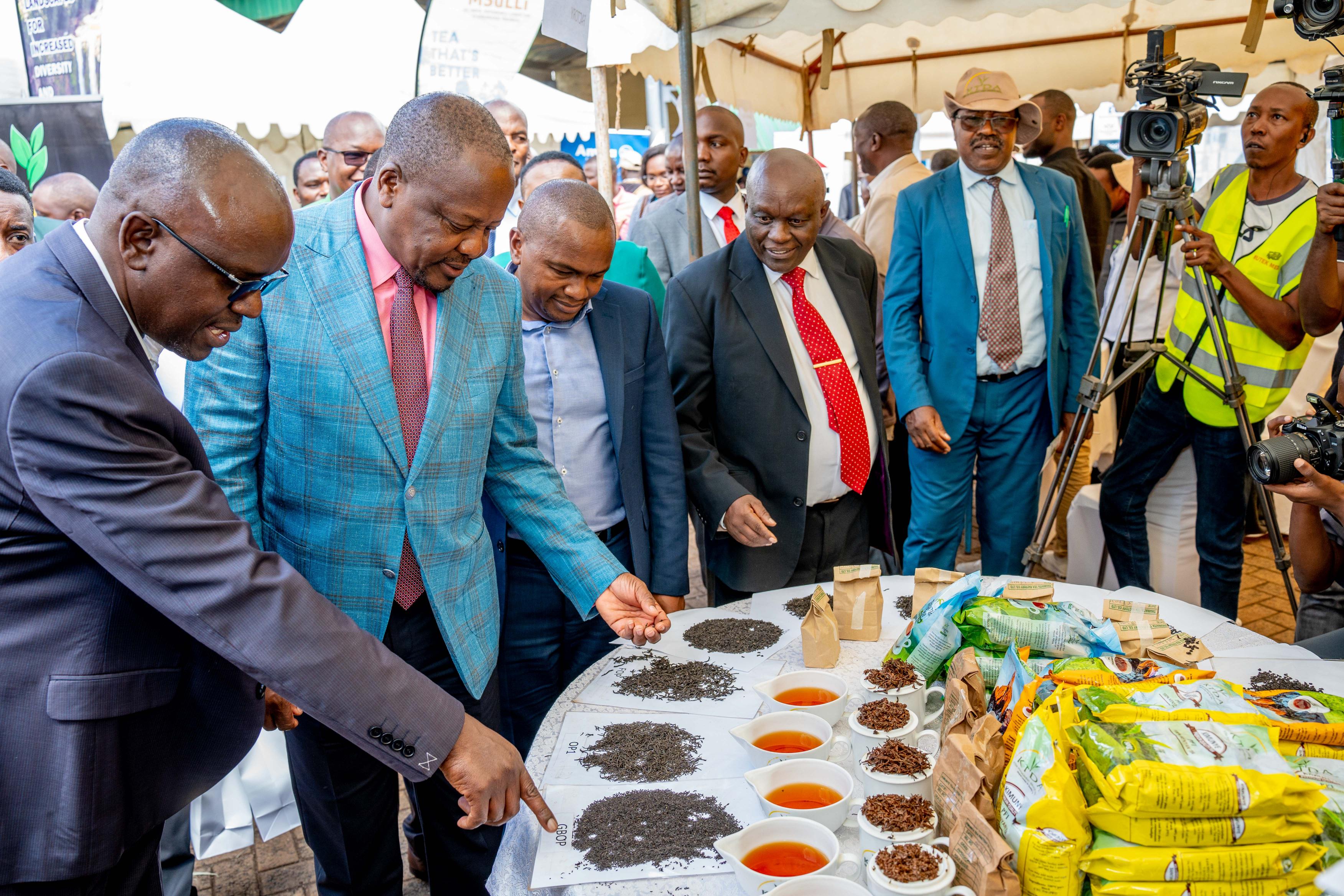
The government is mulling the removal of excise duty on tea packaging materials to encourage value addition and enhance the crop’s profitability.
Agriculture Cabinet Secretary Mutahi Kagwe has announced the state is also considering removing VAT on value-added tea exports.
The CS, who spoke during the International Tea Day celebrations at Gacharage tea factory in Kigumo, Murang’a, said the measures are aimed at making it affordable for smallholder factories and processors to package local tea.
“This will promote competitiveness in the international markets and ultimately accelerate farmers’ incomes,” Kagwe said.
Removing the duties, he said, will also make it cheaper for buyers to process tea locally than in their countries.
This will in turn enable tea farmers to sell their packaged produce directly to foreign markets and make more money.
The government, he added, has opened the sector up to direct sales that will allow producers to negotiate directly with international buyers, eliminating middlemen and promoting price transparency that will ensure the real price of tea is returned to the farmer.
He said many farmers complain they do not know what happens at the Mombasa tea auction.
The CS, however, urged factories to label their tea brands as ‘Kenya Tea’ for easier identification in foreign shelves.
“From the brand that you create, ensure after your brand name that you indicate the tea is from Kenya. From here henceforth, factories can sell their tea direct and those who were packaging their tea in Dubai or Germany can do so in Kenya because it will be cheaper,” the CS said.
Kagwe also revealed the government plans to invest in common user packaging facilities that will relieve factories of the burden of packaging their products.
One such facility will be established at Dongo Kundu in Mombasa while another one will be in Nakuru county.
“If you have bulk tea and you don’t want your factory to have it packaged, the common user facilities will package it for you at a small fee. This will save factories from the huge investment, especially those who don’t have the funds for it,” Kagwe said.
The CS urged them to make internal arrangements to invest in the plants. Orthodox tea is produced using traditional methods that preserve the integrity of the tea leaves that includes withering, rolling, oxidation and drying without tearing them apart and fetches much higher prices in the market.
As part of the reforms in the agriculture sector, the state will also partner with private agrovets to provide subsidised fertilisers to farmers.
Currently, the fertiliser is disbursed through the National Cereals Produce Board (NCPB) warehouses that are sometimes far away from farmers, making them inaccessible.
The private agrovets will ensure farmers get the subsidised fertiliser near their homes, incurring little transport costs.
Kagwe, however, challenged smallholder tea factories against depending on the government for establishment of orthodox tea plants, saying the government may not have the capacity to provide the funds now.
“I strongly encourage smallholder factories to invest in tea value addition to diversify into flavoured, herbal, instant and specialty teas and build strong Kenyan brands that command premium prices globally,” he said.
“Let us also embrace digital marketing and e-commerce platforms to expand our reach to international consumers who are actively seeking authentic, high quality teas. The future of tea lies not only in quantity, but quality, innovation and direct access to the global market place.”
The tea sector supports more than 650,000 smallholder farmers and is one of the main cash crops in the country.
In 2024, the sector earned Sh215 billion, with Sh181 billion being from exports, while Sh18 billion were from local sales, with a total of 598 million kilos sold.
Isaac Tongola, the executive director of Fairtrade Africa that organised the celebrations, said tea is not only an agricultural commodity but a part of the Kenyan identity and a vital engine of the economy.
He said only one in five tea farmers and workers in Kenya earn enough to meet their basic needs.
The sector is also facing devastating impacts of climate change that is reducing yields, as the average global prices stagnates at $2 per kilogramme for the last several years.
“At Fairtrade Africa, we view these challenges as calls to action and opportunities to restructure the sector in ways that are just, equitable and sustainable,” Tongola said.
The organisation has worked with tea farmers from Malawi, Uganda, Mozambique, Tanzania and Kenya for over two decades.
Fairtrade helps strengthen organisational governance, advance gender equity and enhance farm productivity while improving access to education and workers welfare.
“Fairtrade minimal price acts as a financial safety net that shields certified producers from market volatility, allowing them to plan and invest with a measure of confidence”.

















